|
|
|
Sort Order |
|
|
|
Items / Page
|
|
|
|
|
|
|
| Srl | Item |
| 1 |
ID:
065239
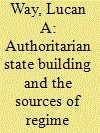

|
|
|
| 2 |
ID:
106438
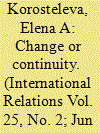

|
|
|
|
|
| Publication |
2011.
|
| Summary/Abstract |
This article examines the discourse of the EU's relations with eastern Europe under the recently launched Eastern Partnership (EaP) initiative. First, it evaluates the EaP's conceptual framework to suggest that there seems to be more continuity than change in the EU's modus operandi with its neighbours. More crucially, the notion of 'partnership', central to the new philosophy of cooperation with the outsiders, continues to be ill defined, causing a number of problems for the effective and legitimate realisation of the European Neighbourhood Policy/Eastern Partnership in the region. Second, drawing on the empirical investigations of the official discourses in Belarus, Ukraine and Moldova, the article reveals an increasing gap between EU rhetoric and east European expectations. In the absence of adequate partnership response to the needs and interests of 'the other', the policy is unlikely to find anticipated legitimation in the neighbourhood.
|
|
|
|
|
|
|
|
|
|
|
|
|
|
|
|
| 3 |
ID:
134130
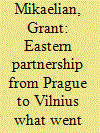

|
|
|
|
|
| Publication |
2014.
|
| Summary/Abstract |
On 28-29 November, 2013, Vilnius hosted the 3rd Eastern Partnership Summit, at which several former Soviet republics were expected to ascend to a higher institutional level in their relations with the European Union. Belarus and Azerbaijan preferred to step aside, while two other members (Armenia and Ukraine) left the program in the fall of 2013 when the talks were over. Georgia and Moldova initialed, but did not sign, the Association Agreement with the EU. This means that four-and-a-half years of this highly ambitious program produced very modest results, to say the least, very much due to the fact that Ukraine, the region's biggest player, excused itself from signing.This did not put a full-stop to the relations between the Eastern Partnership (EP) members and the EU, however the Vilnius Summit marked an intermediate finish of sorts. The old strategy ran into a dead end, leaving Brussels without a new strategy for its relations with its Eastern neighbors. To move forward, the EU should try to find out what went wrong. We should analyze what has happened and why. Here I have tried to comprehend how the relations between the EU and Soviet successor-states developed under the project to provide (probably delayed) answers to the following questions:
1. Did the summit fail because Russia was very skeptical about the results of European integration for its neighbors?
2. Why did this problem come to the fore in mid-2013 rather than in 2008 when it all started?
3. Why did the Russian factor (described as an imminent threat to the European programs on the post-Soviet space) remain neglected?
To correctly understand the motivation of what has been done and to avoid unsubstantiated assessments, we need to look at what happened in Vilnius from the perspective of Brussels, Moscow, and the post-Soviet capitals involved.
I will rely on the chronology of the EP project divided into three key periods:
-from May 2008 when the program was announced to May 2009 when it started;
|
|
|
|
|
|
|
|
|
|
|
|
|
|
|
|
| 4 |
ID:
075247
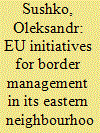

|
|
|
|
|
| Publication |
2006.
|
| Summary/Abstract |
Oleksander Sushko turns more generally to the EU's policies towards the neighbouring east. The focus of Sushko's analysis is on border management. The author analyses the impact and effectiveness of EU initiatives towards the east on border management goals, as elaborated in the ENP. These goals seek to foster an open and cooperative eastern border, while concomitantly ensuing its security, transparency and control. In relation to the border management question, Sushko analyses three new EU policy initiatives in the region: the EU's upgraded role in the Transnistrian conflict, the EU Border Assistance Mission to Ukraine and Moldova and the EU's role in the new Moldova-Ukraine customs regime. The author concludes that these new initiatives prove that only through intense and multifaceted involvement can the EU realistically aspire to engendering constructive domestic and regional change, which could in turn contribute to the fulfilment of the EU's border objectives.
|
|
|
|
|
|
|
|
|
|
|
|
|
|
|
|
| 5 |
ID:
007343
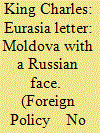

|
|
|
|
|
| Publication |
Winter 1994-95.
|
| Description |
106-120
|
|
|
|
|
|
|
|
|
|
|
|
|
|
|
|
| 6 |
ID:
123566
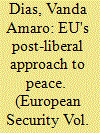

|
|
|
|
|
| Publication |
2013.
|
| Summary/Abstract |
This article analyses what may be termed as the European Union's (EU) post-liberal approach to the Moldova-Transnistria conflict. Since 2003, within the ENP framework, the EU has become increasingly committed to its transformation. Such an engagement is further confirmed by the establishment of the European Union Border Assistance Mission to Moldova and Ukraine (EUBAM) in 2005, aimed at building confidence between the parties, stimulate their economic interdependence and change perceptions about the conflict. The mission's outcomes are moving beyond its technical scope, supporting the conflict peaceful transformation. The focus on bottom-up initiatives and local engagement allows for a broader understanding of the complex dynamics underlying the conflict, which together with the high-level negotiation process may provide a holistic approach to its resolution and increase the likelihood to reach a sustainable settlement.
|
|
|
|
|
|
|
|
|
|
|
|
|
|
|
|
| 7 |
ID:
099503
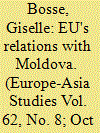

|
|
|
|
|
| Publication |
2010.
|
| Summary/Abstract |
This article examines recent EU-Moldova relations under the European Neighbourhood Policy (ENP) and the Eastern Partnership (EaP) in order to assess the EU's policies and their (limited) effectiveness over the past decade. I draw on the 'external governance approach' and develop the 'partnership as cooperation perspective' to examine which approach prevails in the theory and in the political practice of EU-Moldova relations. Whereas the external governance approach focuses on the expansion of EU rules to assess the effectiveness of the EU's external relations, the partnership perspective draws attention to effective cooperation based on mutual concessions in areas of converging preferences.
|
|
|
|
|
|
|
|
|
|
|
|
|
|
|
|
| 8 |
ID:
132709
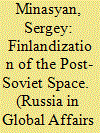

|
|
|
|
|
| Publication |
2014.
|
| Summary/Abstract |
Armenia, opting for self-restraint of its own accord, minimized its risks and losses. As to whether the Armenian-style Finlandization can be an example for other former Soviet republics would depend not only on their own choice.
|
|
|
|
|
|
|
|
|
|
|
|
|
|
|
|
| 9 |
ID:
174390
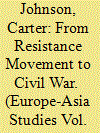

|
|
|
|
|
| Summary/Abstract |
This article compares resistance movements along the western borderlands of the Soviet Union between 1944 and 1952. Despite similar levels of state repression and local grievances, Moldova’s opposition movement did not escalate to the level of civil war, whereas civil wars emerged across the Baltic states, Belarus, and Ukraine. Through theory development and testing, the article compares Lithuania and Moldova, identifying the role of previous regime behaviour, the speed of Soviet takeover, and the availability of safe havens within Moldova and Lithuania as the key causal factors explaining the difference.
|
|
|
|
|
|
|
|
|
|
|
|
|
|
|
|
| 10 |
ID:
091047
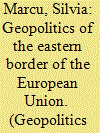

|
|
|
|
|
| Publication |
2009.
|
| Summary/Abstract |
Since the fall of the communist regimes, we have been witnessing in Europe two phenomena that dominate the geopolitical scene: on the one hand there is integration, with the advance of the borders of the European Union (EU) towards the east through its two enlargements, and on the other hand there is disintegration, as expressed by social crisis, and latent tensions and conflicts in the countries found beyond the said border. This article focuses on the geopolitical changes that came about on the eastern border of Europe (Romania-Moldova-Ukraine) and the border relations between these three countries after the fall of the Soviet Union, and the integration of Romania into the EU. This is both a multidimensional and ethno-territorial border, associated with tensions and conflict.1 Using the territorial dialectic of the globalisation argument, we are able to analyse, describe and interpret from a theoretical-empirical standpoint, the two current discussions about that border: opening by means of cooperation, or closing by means of control and security.
|
|
|
|
|
|
|
|
|
|
|
|
|
|
|
|
| 11 |
ID:
074035
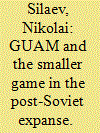

|
|
|
| 12 |
ID:
057696
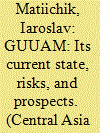

|
|
|
| 13 |
ID:
144778
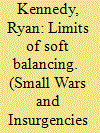

|
|
|
|
|
| Summary/Abstract |
Both the EU and NATO have greatly expanded efforts to address the frozen conflict in Transnistria since 2003. These efforts by and large fall neatly into the category of ‘soft balancing’ actions against Russian influence in the conflict and in Moldova more generally. Given that soft balancing is normally seen as a strategy undertaken by relatively weak actors vis-à-vis a global or regional hegemon, this behavior is puzzling. The actions of these institutions demonstrate that soft balancing is a logical strategy for stronger actors when the conflict is not as salient as for the weaker actor. The EU and NATO’s desire to resolve the conflict is not salient enough to warrant a costlier hard power strategy. Recent developments in Ukraine also demonstrate the limitations of this strategy. Specifically, the application of this soft power has done little to change the incentives for separatist leaders or their Russian backers, meaning they have little ability to resolve the conflict. They have also fallen short of creating a permanent pro-Western consensus in Moldova. They do, however, augment Moldova’s ability to adapt to the challenges posed by the conflict and provide a paper wall against more aggressive Russian ambitions in the region.
|
|
|
|
|
|
|
|
|
|
|
|
|
|
|
|
| 14 |
ID:
122983
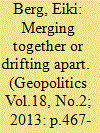

|
|
|
|
|
| Publication |
2013.
|
| Summary/Abstract |
One way to approach conflict management is to use a four-dimensional political legitimacy criterion, which could set the agenda for enhancing peace prospects in Cyprus, Moldova and Bosnia and Herzegovina (BiH). Here the argument is that through measuring the internal legitimacy of conflicting parties and then comparing and contrasting the given empirical values on the scales of cohesion/security and democracy/performance, we may be able to distinguish conflicting pairs either "merging together" or "drifting apart", depending on how the secessionist entities position themselves vis-à-vis their parent states. Empirical facts on the ground tell us that Cyprus may have the biggest chances of reunification, whereas Moldova's perspective looks meagre. The BiH, which has preserved its territorial integrity, faces real secessionist challenges, given the illegitimacy of the state and a manifest dissatisfaction with systemic deficiencies.
|
|
|
|
|
|
|
|
|
|
|
|
|
|
|
|
| 15 |
ID:
181522
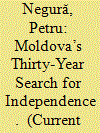

|
|
|
|
|
| Summary/Abstract |
Unlike in the Baltics, support for independence in Moldova was relatively low among the political elites and the general population when the Soviet Union collapsed. In the 1990s, the political parties in power pursued an incoherent program, as governments swung between reformist and conservative agendas. Economic crises and systemic corruption depleted citizens’ trust in politicians and state institutions. This low institutional trust has hampered governance at all levels, and primarily in crises such as the COVID-19 pandemic.
|
|
|
|
|
|
|
|
|
|
|
|
|
|
|
|
| 16 |
ID:
185046
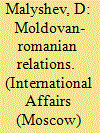

|
|
|
|
|
| Summary/Abstract |
RELATIONS between Moldova and Romania have a fairly long history. It is not entirely correct to say that Moldovans and Romanians are the same people, although some politicians in the Republic of Moldova (RM), including its current president, Maia Sandu, try to present the situation precisely in this light. But detailed analysis leads to the conclusion that the Moldovans are a nation with their own history and culture that are by no means identical to Romanian history and culture. As for the population of Transnistria, it has virtually no relation to Romania. After all, most of the territory of Bessarabia (the historical name of modern Moldova) consisted of lands located between the Black Sea and the Dniester, Prut, and Danube Rivers. Today, this territory is part of the modern Republic of Moldova and southern Ukraine.
|
|
|
|
|
|
|
|
|
|
|
|
|
|
|
|
| 17 |
ID:
099502
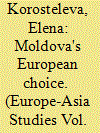

|
|
|
|
|
| Publication |
2010.
|
| Summary/Abstract |
The article examines EU-Moldovan relations from the perspective of the external governance framework. It reveals some considerable progress in the procedural engagement of both parties. However, the internal instability experienced by Moldova in 2009 is seen to have disrupted these relations, stalling further negotiations and even questioning Moldova's true commitment to Europe. To understand this ostensibly sudden change in Moldova's allegiance to Europe, it is argued that analysis needs to go beyond conventional governance framework(s). Premised on the notion of 'constitutive boundaries' a 'partnership' perspective offers a more nuanced understanding of the boundaries of 'the other', thus revealing the salience of geopolitics and culture in Moldova's relations with the outside world.
|
|
|
|
|
|
|
|
|
|
|
|
|
|
|
|
| 18 |
ID:
114456
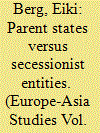

|
|
|
|
|
| Publication |
2012.
|
| Summary/Abstract |
This article questions whether a relatively strong conviction that legitimacy conveys nothing more than acceptance derived from legal recognition. Therefore several indices are constructed which are applicable to comparing and contrasting four major dimensions of political legitimacy both in parent states and in secessionist entities. In measuring political legitimacy in Cyprus, Moldova and Bosnia & Hercegovina in terms of identity and security on the one hand, and democracy and performance on the other, we may be able to observe cases where internal legitimacy has been neglected by the international community. This article concludes that legitimacy is a variable continuously used in the support and rejection of secessionist bids and integrationist endeavours.
|
|
|
|
|
|
|
|
|
|
|
|
|
|
|
|
| 19 |
ID:
075248
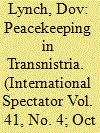

|
|
|
|
|
| Publication |
2006.
|
| Summary/Abstract |
Turning to Moldova, Dov Lynch analyses how and why the conflict in Transnistria remains unresolved. The "frozen" nature of the peace process in the Moldova-Transnistria conflict is due to a set of local, national, regional and international factors. These include the separatist platform of the Transnistrian leadership on the one hand and the weakness of the Moldovan state on the other. Regional and international factors fuelling the stalemate include Russian interests, Ukrainian ambiguity, and the international community's relative neglect, all of which have contributed to a distorted and cumbersome process of international peacekeeping and mediation. Yet Lynch discusses how several of these factors are undergoing a process of deep-rooted evolution. Hence, while the peace process remains frozen, the conflict itself is not. The foreign policy shift of the Moldovan government since 2003, the hardening stance of the Transnistrian authorities, the increased assertiveness of Russia, the growing involvement of the enlarged EU and the regime change in Ukraine have all altered the state of play in the conflict. The ensuing unfreezing of the status quo presents both risks and opportunities. In order to capitalise on the latter, Lynch sets forth several guidelines for EU policy in the region.
|
|
|
|
|
|
|
|
|
|
|
|
|
|
|
|
| 20 |
ID:
107042
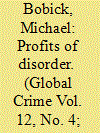

|
|
|
|
|
| Publication |
2011.
|
| Summary/Abstract |
This article looks at the multiple constructions that constitute the image of the Transnistrian Moldovan Republic (PMR), a separatist region located in eastern Moldova. The European Union (EU) and the international community construct the area as a 'black hole', a security and terrorist concern. The PMR has constructed the state's image on the basis of the memory of collective suffering at the hands of Moldovan oppression, in a fashion that resembles state building in nineteenth-century Europe. The best-selling author Nicolai Lilin invests a criminal Ruritania in his fake memoir of criminal tales and exploits. The article shows that a degree of order and legitimate means to make money exist in the PMR while it highlights a key and largely ignored element of the political economy of the PMR, namely the economic role and monopolistic practices of Sheriff and the strong interconnection between politics and economic activities.
|
|
|
|
|
|
|
|
|
|
|
|
|
|
|
|
|
|
|
|
|